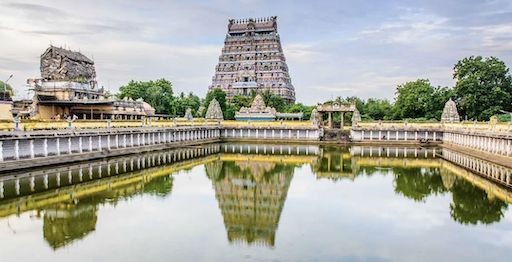
Chidambaram
Chidambaram is one of the many temple towns in the state which is named after the groves, clusters or forests dominated by a particular variety of a tree or shrub and the same variety of tree or shrub sheltering the presiding deity.[2] The traditional name of the temple complex, Chidambaram Thillai Nataraja-koothan Kovil. The mangrove forests of Thillai trees (Excoecaria agallocha) were abundant in the town once. The temple and the town were once in the midst of Thillai trees. The Thillai trees of the nearby Pichavaram wetlands, the second largest mangrove forest in the world, extends to the temple area. The shrine is venerated as Thillai ambalam literally meaning the open stage of Thillai.[3] The name of the town of this shrine, Chidambaram comes from the Tamil word Chitrambalam (also spelled Chithambalam) meaning “wisdom atmosphere”. The roots are citta or chitthu means consciousness or wisdom while and ambalam means “atmosphere”.[4][5] This composite word comes from its association with Nataraja (Shiva), the cosmic dancer and the cultural atmosphere for arts.[4]
According to Hindu legend, in the Thillai forests resided a group of sages who believed in the supremacy of magic — that the gods could be controlled by rituals and mantras. Shiva, hearing this, assumed the form of Bhikshatana, a simple mendicant seeking alms, and went walking in Thillai. He was followed by his consort, Vishnu as Mohini. The sages and their wives were enchanted by the beauty of the pair. On seeing their womenfolk enchanted, the angry sages performed a ritual to create serpents (nāga). Shiva lifted the serpents and donned them as ornaments on his matted locks, neck and waist. Further enraged, the sages invoked a fierce tiger, whose skin was used by Shiva as a shawl around his waist. Then followed a fierce elephant, which was ripped to death and devoured by Shiva (an episode depicted in the Gajasurasamhara). The sages gathered all their spiritual strength and invoked the powerful demon Muyalakan — a symbol of complete arrogance and ignorance.[citation needed] Shiva smiled gently, stepped on the demon’s back to immobilise him, and performed the Ánanda Thandavam (the dance of eternal bliss), thus disclosing his true form. The sages surrendered, realizing that rituals cannot control the gods.[6]